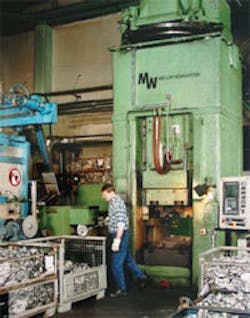Aluminum continues to attract the interest of automotive designers because its lightness (usually about one-third as heavy as steel in comparable volumes) and weldability make it useful for many of the applications that reduce the vehicle weight and mass — thus rendering them more energy efficient.
Umformtechnik Radebeul GmbH is an aluminum forging operation near Dresden, Germany, that produces drop forgings for cars and motorcycles. The company operates four Mller Weingarten presses, and earlier this year placed an order with M-W for a new, specially outfitted 1,200-metric ton screw press.
“Forging aluminum is not easy and it requires highly specialized know-how,” details Hartmut Kussmaul of Mller- Weingarten’s parent company, the Schuler Group. “The material reacts very sensitively and does not tolerate any errors.”
Because of its particular material flow characteristics, forging aluminum requires equipment that will ensure the die contacts the metal at a controlled impact speed. The press equipment and the dies, as well as the forging lubricant must be optimized to aluminum’s particular behavior.
“Over the years, we have been able to repeatedly prove our expertise in this field to Umformtechnik Radebeul GmbH,” said Kussmaul. The four M-W presses have been installed there since 2002, and the fifth line is being installed now for start-up in October. The new installation will be specifically developed for forging aluminum, and the addition of Mller-Weingarten’s Forge Control System (MW-FCS) will support the goal of high process reliability.
One design detail that Schuler credits for the high performance standards of its 1,200-metric ton screw press is the frequency controlled direct-drive system. It delivers precision control for the targeted forming speed, guaranteeing the targeted finished quality standards for the aluminum parts. The FCS oversees the forging process (set-up, die positioning, manual or automatic operation, as well as programmed settings for the number of blows, energy per blow and pauses between blows) and stores all production data. Operators use a touch-screen to check the process and retrieve documentation.
When the new press starts up this fall Umformtechnik Radebeul will use it to produce a variety of aluminum automotive and motorcycle parts in small and medium runs, with a three-shift operation. Other products will be marketed for engineering, electrical, and construction industry applications. “It is therefore essential that the machine’s control system and programming capabilities guarantee high repeat accuracy for all forming processes,” Kussmaul emphasized. “This is the only way we can secure consistently high quality and thus ultimately ensure the satisfaction of our customers.”
Related Articles
Screw Press Rebuilt in Record Time
Schuler Delivers “World’s Largest” Counterblow Forging Hammer
